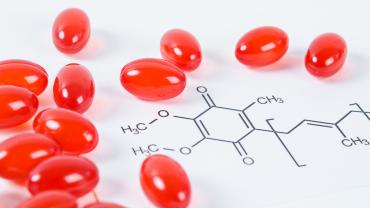
Coenzyme Q10 (CoQ10), also known as ubiquinone due to its extensive presence within the human body, is an important molecule in cellular health. CoQ10 has many roles in the body; it supports antioxidative stress and cell membrane stability. CoQ10 acts as an electron carrier in the mitochondrial electron transport chain during oxidative phosphorylation. It also plays a critical role in cellular energy production. CoQ10 supports cellular health through membrane stabilization, free radical scavenging, and stabilization of calcium‐dependent channels. It also plays a critical role in cellular respiration and adenosine triphosphate (ATP) generation.
Research indicates that CoQ10 may also help support certain aspects of heart health. A previously published prospective randomized trial investigating the potential role of CoQ10 in cardiovascular health reported that long-term supplementation helped support symptom improvement and prevention of certain adverse cardiovascular events in elderly individuals with certain heart-related pathologies.
A recently published clinical trial by Samuel and colleagues explored the potential efficacy of CoQ10 supplementation in the presence of heart failure with preserved ejection fraction and impaired diastolic function in elderly individuals. This prospective, double-blind, placebo-controlled pilot study involved 300 mg of CoQ10 daily for 4 months in 19 individuals, with 20 individuals receiving a placebo. Research indicated biometrics assessments that included echocardiography and serum N-terminal pro-B-type natriuretic peptide (NT-proBNP).
Previous studies have observed improvements in diastolic function in the presence of CoQ10 supplementation in certain individuals. However, the authors of this study did not observe an overall significant effect on diastolic function at the study terminus. The treatment group did experience a greater decrease in mean NT-proBNP levels though when compared to a placebo. Significant differences were also observed in certain echocardiographic parameters in the CoQ10 group.
The study limitations included a relatively small sample size, a high dropout rate, and the measurement of biometrics unrelated to mitochondrial function or cellular energy production. In addition, the authors cite a relatively short treatment duration as an explanation of findings. More research is needed before clinical conclusions can be made. Study strengths included a carefully considered dosing rationale and a high compliance rate for the remaining participants.
CoQ10 has also been shown in recent studies to support gum health in response to age‐related changes; certain deficiencies in CoQ10 have been linked to periodontal disease. Increased concentrations of CoQ10 have been reported in studies to help suppress periodontal inflammation in the presence of diseased gingiva.
CoQ10 is a powerful molecule that helps protect mitochondrial membranes from oxidative damage. Evidence suggests it may also help support certain aspects of cardiovascular health, healthy aging, and cellular energy production.
By Colleen Ambrose, ND, MAT